We have broken these quotations into the following six groups, you can click on the hyperlinks to be taken to each one or read through the introduction first.
- Universal consensus of bishops: St. Basil, St. Augustine, Council of Chalcedon, Pope St. Gregory the Great.
- Patriarchal ratification: Council of Chalcedon, Council of Constantinople II, Council of Nicaea II, St. Tarasios of Constantinople, St. Nikephoros of Constantinople.
- Great number of saints present: St. Athanasius, St. John of Damascus
- Truth: St. Maximos the Confessor.
- Ratification by Rome: Socrates & Sozomen.
- A great number of bishops, ordered by Rome, and convened by the emperor: Hincmar of Rheims.
Of these, ratification by Rome fits into the framework of patriarchal ratification as Rome was the first ranked patriarch and head of the synod. Further, universal consensus also fits into the model of patriarchal ratification because bishops almost always voted in blocks according to their patriarch’s decision. So for all intents and purposes, these three catagories should be counted as one because they are all components of the same system. A “great number of saints” could be understood also to be understood in terms of universal consensus and therefore, patriarchal ratification.
Only the circular argument offered by St. Maximus regarding truth and that offered by Hincmar of Reims (ordered by Rome, convoked by the emperor) are outliers as St. Maximus never delineates how one is to know if truth has been declared and Hincmar’s standard does not apply strictly to even one ecumenical council.
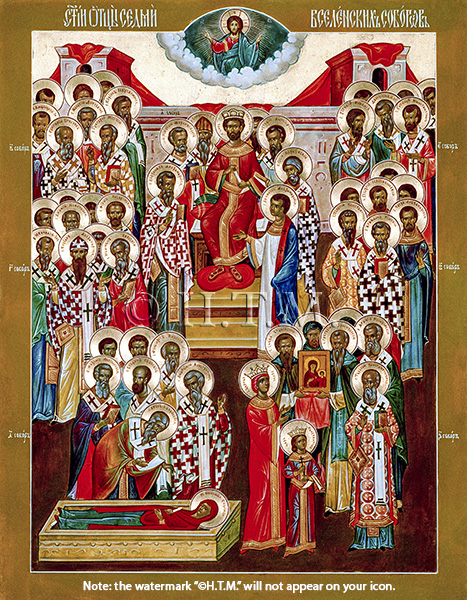
Before launching into the Patristic quotations, a few words need to be said about the term “ecumenical council.” It is typically used to mean a council is “infallible” or “binding upon the faithful.” This is not necessarily the meaning used in patristic literature of the first millennium where it typically means a council convoked and paid for by the Empire (hence the “oikoumene” – “world,” “empire”). Because of this understanding of what “ecumenical” meant, writers semi-regularly used it to refer even to councils which did not teach correctly such as the Robber Synod of Ephesus II in 449. Therefore, using the term “ecumenical” to define which councils are or are not binding upon the faithful reflects a later Roman Catholic understanding of what the term means and is not patristic. Perhaps a better question is “What makes a council binding upon the faithful?” or “How do we know which councils are teaching correct dogma and are to be followed?”
Though much has been said by Roman Catholic apologists regarding the role of Rome in ratifying councils (this is well attested to by saints and non-saints alike, both East and West) and therefore need not be repeated here as it is already well documented. What does need to be documented is the fuller picture in which the Pope among the other Church leaders and within the conciliar model, plays a significant role as the head of the synod and just as a prime minister ratifies the decision of the parliament, the role of the pope was to ratify the decision of the council, of which he was the head. In other words, the issue with Roman Catholic apologists and within the Roman Catholic model is they falsely assume that the pope ratifying a council means the pope can override the other bishops and can issue a dogmatic statement without the consent of the bishops. That is false because the right to ratify is a passive ability and does not allow one to order others what to do but instead places them as a gate keeper who can say “yes” or “no” but is unable to say “go do this” or “you must do that.” In other words, it is the power of allowance, not of command. The Romans understood this in two juxtaposed political terms: potestas and auctoritas. While potestas was authority in the sense of power to order others what to do, auctoritas was a varied term describing prestige, witness, soft power, the passive right to ratify the decisions of others and invest them with potestas, etc., it did not refer to the ability to issue orders, in fact, it ruled it out.
This is a living document so if you have additional quotations to add to this, please post them down below or email them to ubipetrus2019@gmail.com.
Universal Consensus of Bishops
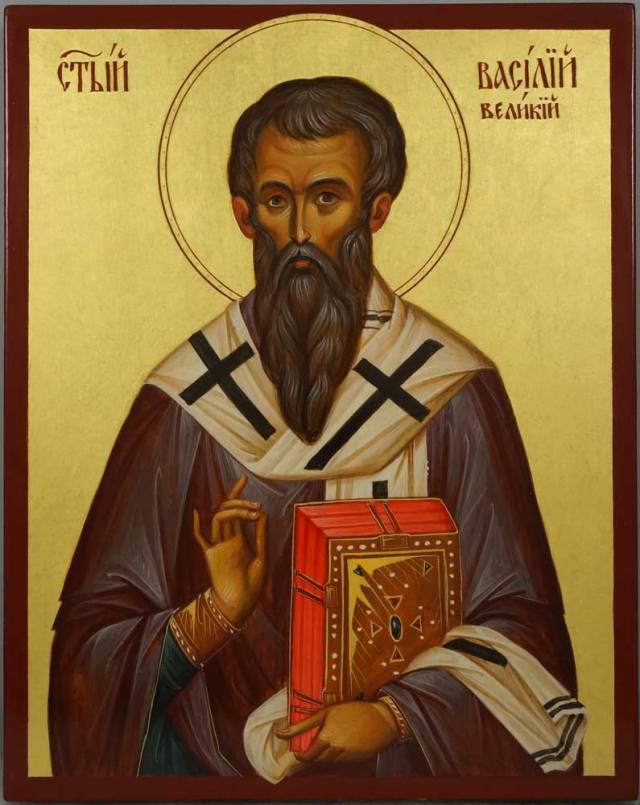
“That you should confess the faith put forth by our Fathers once assembled at Nicaea, that you should not omit any one of its propositions, but bear in mind that the three hundred and eighteen who met together without strife did not speak without the operation of the Holy Ghost, and not to add to that creed the statement that the Holy Ghost is a creature, nor hold communion with those who so say, to the end that the Church of God may be pure and without any evil admixture of any tare.”
St. Basil to Cyriacus, NPNF-2, Vol. 8, Ep 114
As per St. Athanasius, also in this florilegium, the 318 at Nicea were believed to have been representative of the Church and so consisted of universal ratification.
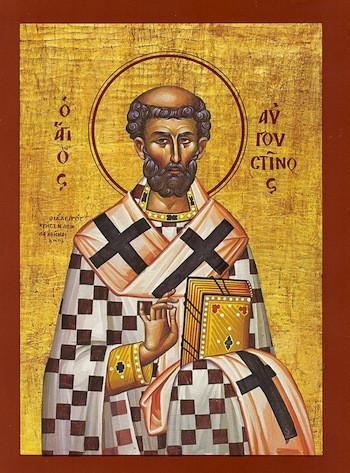
“[H]e, I say, abundantly shows that he was most willing to correct his own opinion, if any one should prove to him that it is as certain that the baptism of Christ can be given by those who have strayed from the fold, as that it could not he lost when they strayed; on which subject we have already said much. Nor should we ourselves venture to assert anything of the kind, were we not supported by the unanimous authority of the whole Church, to which he himself would unquestionably have yielded, if at that time the truth of this question had been placed beyond dispute by the investigation and decree of a plenary Council. For if he quotes Peter as an example for his allowing himself quietly and peacefully to be corrected by one junior colleague, how much more readily would he himself, with the Council of his province, have yielded to the authority of the whole world, when the truth had been thus brought to light?”
St. Augustine, “On Baptism against the Donatist” NFPF-1, Vol. 4, Epistle 2:5“What the custom of the Church has always held, what this argument has failed to prove false, and what a plenary Council has confirmed, this we follow!” [“Plenary” from the Latin “plenus” meaning “full” or “complete.”]
St. Augustine, On Baptism against the Donatist, NPNF-1, Vol. 4, Epistle 4:10
“As to those other things which we hold on the authority, not of Scripture, but of tradition, and which are observed throughout the whole world, it may be understood that they are held as approved and instituted either by the apostles themselves, or by plenary Councils [“Plenary” from the Latin “plenus” meaning “full” or “complete.”], whose authority in the Church is most useful, e.g. the annual commemoration, by special solemnities, of the Lord’s passion, resurrection, and ascension, and of the descent of the Holy Spirit from heaven, and whatever else is in like manner observed by the whole Church wherever it has been established.”
St. Augustine, To Januarius, NFPF-1, Vol. 1, Epistle 54:1
The Fourth Ecumenical Council, Chalcedon (451)
“Aetius the most devout archdeacon said: ‘There is also the letter
written by the most holy Cyril, [now] among the saints, then bishop of the great city of Alexandria, to Nestorius, which was approved by all the holy bishops who assembled previously at Ephesus to condemn the same Nestorius, and was confirmed by the signatures of all. There is also the letter of the same Cyril, [now] among the saints, written to John of sacred memory, then bishop of the great city of Antioch, which was likewise confirmed. If it please you, I shall read them.’” Price, Acts of Chalcedon Session 2. Vol 2, p. 13
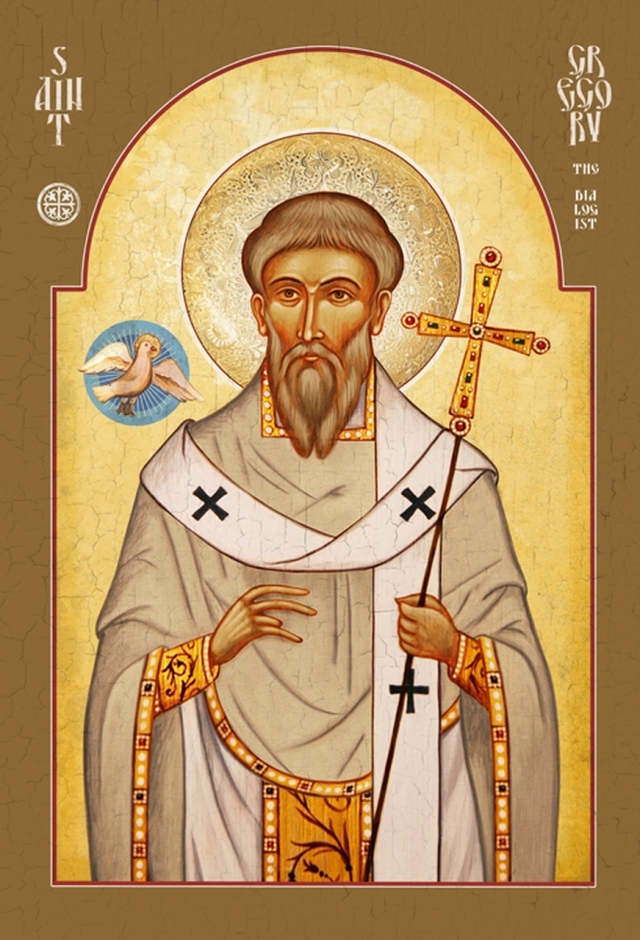
“Besides, since with the heart man believeth unto righteousness, and with the mouth confession is made unto salvation, I confess that I receive and revere, as the four books of the Gospel so also the four Councils: to wit, the Nicene, in which the perverse doctrine of Arius is overthrown; the Constantinopolitan also, in which the error of Eunomius and Macedonius is refuted; further, the first Ephesine, in which the impiety of Nestorius is condemned; and the Chalcedonian, in which the pravity of Eutyches and Dioscorus is reprobated. These with full devotion I embrace, and adhere to with most entire approval; since on them, as on a four-square stone, rises the structure of the holy faith; and whosoever, of whatever life and behaviour he may be, holds not fast to their solidity, even though he is seen to be a stone, yet he lies outside the building. The fifth council also I equally venerate, in which the epistle which is called that of Ibas, full of error, is reprobated; Theodorus, who divides the Mediator between God and men into two subsistences, is convicted of having fallen into the perfidy of impiety; and the writings of Theodoritus, in which the faith of the blessed Cyril is impugned, are refuted as having been published with the daring of madness. But all persons whom the aforesaid venerable Councils repudiate I repudiate; those whom they venerate I embrace; since, they having been constituted by universal consent, he overthrows not them but himself, whosoever presumes either to loose those whom they bind, or to bind those whom they loose. Whosoever, therefore, thinks otherwise, let him be anathema. But whosoever holds the faith of the aforesaid synods, peace be to him from God the Father, through Jesus Christ His Son, Who lives and reigns consubstantially God with Him in the Unity of the Holy Spirit for ever and ever. Amen.”
Pope St. Gregory the Great to John of Constantinople. NPNF-2, Vol 12, Book 1, Epistle 25
Patriarchal Ratification
The bishops typically voted in blocks along with their patriarch – canon 34 of the Apostolic Canons, canon 30 of Chalcedon, the Antiochian contingent setting up a counter council at Ephesus in 431, etc. witness to this – the agreement of the patriarchs was the shorthand for ensuring the agreement of the bishops as very few bishops would vote against the view of their patriarch. The patriarchal system began as three bishops: Rome, Alexandria, and Antioch, but was so expanded to include Jerusalem and then Constantinople. In time, it was expanded even further to include Georgia, Bulgaria, Serbia, Moscow, etc.
The Fourth Ecumenical Council, of Chalcedon (451)
“The most glorious officials and the exalted senate said: ‘If it seems good to your devoutness, let the most sacred patriarchs [senior bishops] of each diocese [Macedonia, Thrace, Asiana, Pontica, Oriens and Egypt] select, each one, one or two [bishops] from their own diocese, come together, deliberate in common about the faith, and then make their decisions known to all, so that, if all are in accord, every dispute may be resolved, which is what we wish, and if some prove to be of a contrary opinion, which we do not expect, this may reveal their opinions as well.’” Price, Acts of Chalcedon Session 2. Acts of Chalcedon, Fr. Richard Price. Vol 2, p. 11
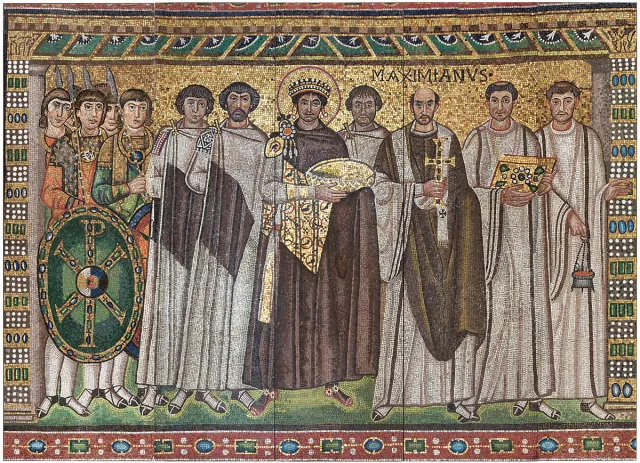
The Fifth Ecumenical Council, Constantinople II (553)
This is of particular importance because Pope Vigilius had privately agreed to the condemnation of the Three Chapters but had publicly refused to condemn them and later issued a decree, the “Constitutum,” excommunicating anyone who anathematized the Three Chapters. The council then suspended the pope from office and used the fact he had privately agreed to their condemnation to pass the edict condemning the Three Chapters. Shortly after the Council closed, the Pope wrote his second Constitutum in which he abrogated his first Constitutum and agreed to the demands of the Council. The Church has ultimately sided with the Council not only by ratifying its acts and decrees but by canonizing the two successive patriarchs of Constantinople that presided over the Council as well as the Emperor, St. Justinian (ruled from 527-565) who convened it. Pope Vigilius, on the other hand, has never been canonized – East or West.
“Your beatitude [Pope Vigilius] knows what is contained in the agreement made between us [the Pope and the council Fathers] in writing: you promised together with the bishops in union and communion with you to meet and investigate the Three Chapters. We ourselves are in communion and union with you, and the meeting ought not to be postponed to give an opportunity for other bishops to be present; nor should the western bishops be divided from the eastern ones, for they are united to each other and share the same convictions. Moreover, in the holy four councils there was never to be found a multitude of western bishops but simply two or three bishops and some clerics. Now, however, many bishops are present from Italy; your beatitude is present, there are also bishops from Africa and Illyricum, and nothing prevents a meeting with us according to what was agreed between us in writing.” […] When such a multitude of bishops are present it is neither seemly nor valid for three or four to meet on their own and transact proceedings among themselves while the other bishops are absent and ignored. This is agreed in writing. For when a few meet for questioning, if you [Pope Vigilius] or some of those with you make an objections, it is not possible for the same persons to be both adversaries and judges in the matter. If, however, you [Pope Vigilius] do not separate yourself apart, it is necessary for joint investigations to be conducted in council; for it is not prudent for a record to be indited in secret with few bishops and without many present. It is better to hold a meeting with priests meeting in love, to adopt a single will in resolving the case and make this known to the remaining priests, so that a common verdict may then be given on the case in writing.” When, however, he [Pope Vigilius] agreed to none of this, we said to him, “The most pious emperor [St. Justinian] had written both to your beatitude and to ourselves inquiring after our verdict on the Three Chapters; and if you do not want to meet according to what was agreed between us in writing, may your beatitude know that we are obliged to meet together and make known our will. […] If, however, you [Pope Vigilius] want a discussion either with all or with some of us, so that a verdict may first be made known to all the other most religious bishops who are present in his imperial city and then confirmed by a joint decree and the case be brought to a close, this the most pious emperor will certainly grant, once a joint decree has been made by all of us over a settlement of the case. If, however, you want a discussion with certain other people, who do not hold the same tenets as ourselves [those who do not condemn the Three Chapters] and are not zealous for the peace of the church, it will be necessary for us, now that we have received an inquiry from the most pious emperor, to send a joint response as to what seems good to us concerning the Three Chapters. But what we ask you, however to declare for the peace of the churches is this – that if what you do within the above-stated days does not suffice to satisfy those who have been scandalized, you remain in our communion even after we have condemned the Three Chapters. […] We ask you to meet with us in priestly charity to decree our common will about the Three Chapters; for thus both your beatitude and we ourselves together with you will be able with justice to ask the most pious emperor to grant us a specific postponement, seeing that it arises from settling the case by a joint decision. […] On both days we communicated the same reply from the most pious emperor, that is, that he [Pope Vigilius] should either meet with you all [the Council Fathers] and discuss the Three Chapters, with permission to raise objections granted to those who wished, or, if he did not assent to this, meet together with the most blessed patriarchs, that is Eutychius of Constantinople, Apollinarius of Alexandria, Domninus of Theopolis, and with other bishops, and discuss with them the verdict that out to be pronounced on the Thee Chapters, and communicate to the other bishops what seemed good to them, so that by the common consent of all a close might be imposed on the case of the Three Chapters. […] We said to him “You have often on your own condemned the Three Chapters both in writing and orally, but the most pious emperor wants you to meet together with the others so that there may be a common judgement on them. On the matter of a deferral, however, you have already applied through others to the most pious emperor, and this majesty replied ‘If you are willing to meet with the most blessed patriarchs and most religious bishops according to the agreement between you, so that you yourself may treat the matter and you may all issue a joint decree on the Three Chapters, I shall not only grant you the postponement you now mention but an even longer one. But because after so long a time we witness you still have recourse to deferrals, we need to be informed by the council of the will regarding the chapters of the most religious priests who have convened for this reason and are staying here for only a time; for we cannot leave the church of God in such a confusion, especially when heretics are calumniating her priests as if they held the Nestorian insanity.’” After we had made this reply, we repeatedly asked him to use our offices to meet together with your holy council; but this he refused to do.’ […] When the most glorious officials had departed, the holy council said: ‘What ensued in the presence of the most blessed Pope Vigilius has been made known by the accounts of the most glorious officials and the most religious bishops. We have consistently maintained and maintain what is right, and have often asked the most holy Pope Vigilius to meet together with us and to issue a decree together with us on the matters under discussion.”
Session 2. Acts of Constantinople II, Fr. Richard Price. Vol 1, p. 211-216
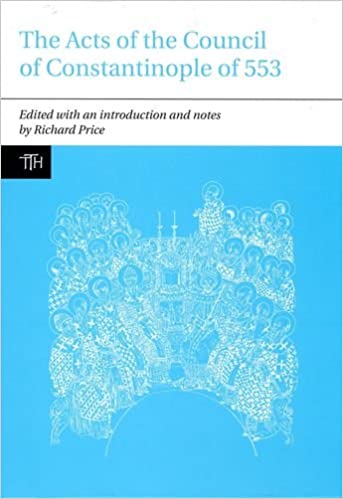
Addressing the Council Fathers, the imperial official, Constantine the quaestor of the palace states:
“But hitherto, he [Pope Vigilius] has postponed meeting in common and accomplishing this with your holy council, although the most pious lord through his officials among whom I myself [Constantine] have played a part exhorted him to meet with you in common, investigate the matter in council […] Those of us who were bishops replied to him, “If, in accordance with what was resolved in the correspondence between ourselves, your beatitude and the most holy patriarchs, and most religious bishops, you order a meeting and a discussion of the Three Chapters, and to issue with all of us a decree in accordance with the orthodox faith, as the holy apostles, the holy fathers, and the four councils did when a common question arose, we recognize you as our head and father and primate. […] [The Emperor speaking as recounted by Constantine] ‘We invited him to meet together with the most blessed patriarchs and the other most religious bishops and in common with them to both investigate and pass judgement on those Three Chapters.”
Session 7. Acts of Constantinople II, Fr. Richard Price. Vol 2, p. 76-77
After reading a series of private correspondences from Pope Vigilius proving he had indeed condemned the Three Chapters in private, the Council continued:
“Constantine, the most glorious quaestor said: ‘While I have been attending your holy council for the reading of the documents that have been made known to you, the most pious emperor has sent a decree to our holy council about the name of Vigilius, to the effect that in view of the impiety he has defended his name should no longer be included in sacred diptychs of the church, and should neither be read out by you nor preserved either in the church of the imperial city or in the remaining churches entrusted to you and to the other bishops in the state assigned to him [each bishop] by God. Hearing this decree, may you again learn from it how greatly the most serene emperor cares for the unity of the holy churches and the purity of the holy mysteries.’
The holy council said ‘May the sacred decree be duly received and read.’ and when Stephen, deacon, notary and instrumetarius had received it, he read out:
In the name of the Lord Jesus Christ. […]
(2) When the most religious pope of Elder Roe arrived in this great city, all these things were made known to him. And when he had examined them, he both condemned them and declared his assurance in writing addressed both to ourselves and to our then spouse of pious memory; for we did not allow anyone who did not condemn this impiety to receive inviolable communion from him or from anyone whomsoever. He also swore dread oaths in writing that he would continue with the same purpose, condemning and anathematizing the aforesaid Three Chapters and would not attempt anything in any way or at any time to rebut the condemnation of the aforesaid impious Three Chapters. Moreover he often condemned the impious Three Chapters orally in the presence of most glorious officials and most religious bishops, as many of you who assembled know. He continued so acting for seven years. Afterwards letters passed between you and him, in which you mutually agree to meet together and compose a condemnation of the aforesaid chapters in council. But afterwards, when invited both by us and by your religious council, he refused to meet in common, and contradicted his own intention by defending the tenets of the followers of Theodore and Nestorius. Moreover he made himself alien to the catholic church by defending the impiety of the aforesaid chapters, separating himself from your communion.
(3) Sincere therefore he has acted in this way, we have pronounced that his name is alien to Christian and is not to be read out in the sacred diptychs, lest we be found in this way sharing in the impiety of Nestorius and Theodore. Accordingly we earlier made this known to you by word of mouth, but now we inform you in writing through our officials, that his name is no longer to be included in the sacred diptychs. We ourselves, however, preserve unity with the apostolic see, and it is certain that you also will guard it. For the change to the worse in Vigilius or in anyone else cannot hard the peace of the churches. May the Godhead keep you safe for many years, holy and most religious fathers. […]
The holy council said: ‘What has now seemed good to the most pious emperor is consonant with the labours he has borne for the unity of the holy churches. Let us therefore preserve unity with the apostolic see of the sacrosanct church of Elder Rome, transacting everything according to the tenor of the texts that have been read. On the case before us let what we have already resolved proceed.’”
Session 7. Acts of Constantinople II, Fr. Richard Price. Vol 2, p. 99-101
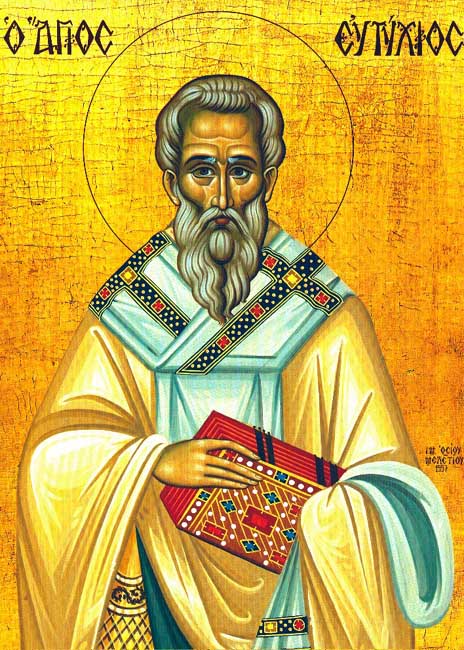
Not only does the council use the Pope’s own statements against him but it then passes the decrees in his absence showing his approval had already privately been given. It then suspends Pope Vigilius from office leaving the see of Rome vacant until the Pope corrects himself.
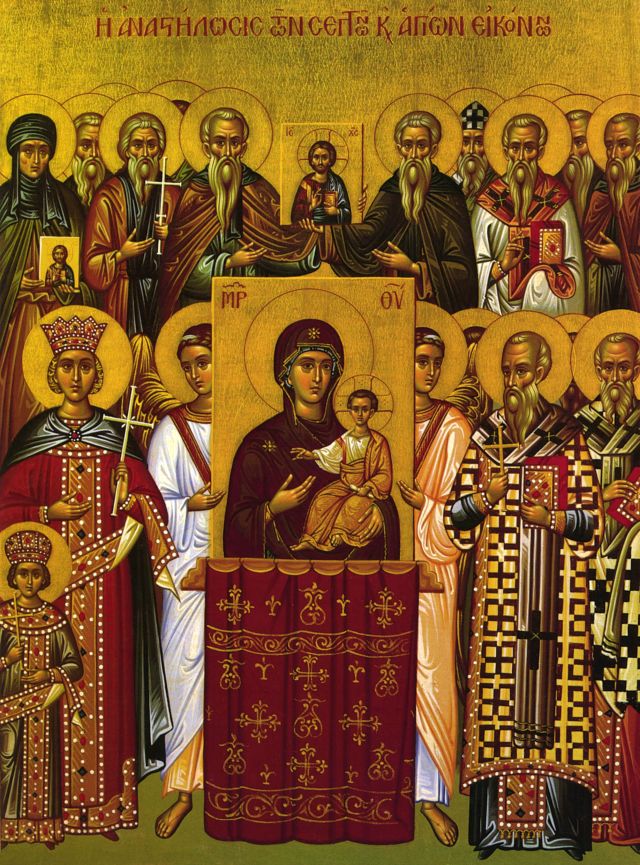
“When the holy and ecumenical fifth council had assembled at Constantinople, a common and universal anathama was imposed on Origen and Theodore of Mopsuestia and on the teaching of Evagrius and Didymus on pre-existence and a universal restoration, in the presence and with the approval of the four patriarchs.”
7th Ecumenical Council (787), Session I (Price, Acts p. 132)
Notice, only four patriarchs are mentioned as Pope Vigilius, whom the council suspended from office for rejecting the condemnation of the Three Chapters, refused to attend until the very end. In the eyes of the Fathers at Constantinople II and the Fathers at Nicea II, the Roman see was simply vacant at that point. This is one reason why the Orthodox Church can still have dogmatically binding councils: because the seat of Rome, in our eyes, is vacant.
“Tarasios the most holy patriarch said: “I too reject those who have been ordained for this reason, for the destruction of the faith, especially if there were orthodox bishops available by whom they could have been ordained; for such was the opinion of the Fathers. If there was a synodical pronouncement and unanimity in the churches concerning orthodoxy, he who has the presumption to be ordained by profane heretics is to suffer deposition.”
7th Ecumenical Council (787) Session I (Price, Acts p. 138-139)
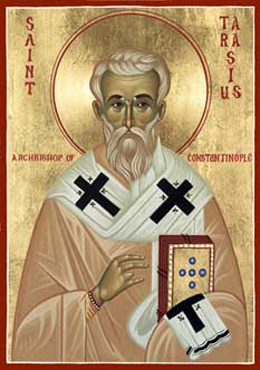
“And how can a council be ‘great and ecumenical’ when it received neither recognition nor assent from the primates of the other churches, but they consigned it to anathema? It did not enjoy the cooperation of the then pope of Rome or his priests, neither by means of his representatives or an encyclical letter, as is the rule for councils; nor did it win the assent of the patriarchs of the east, of Alexandria, Antioch, and the holy city, or of their priests and bishops.”
7th Ecumenical Council (787), 6th Session, Official Refutation of the Horos of Hiereia. (Price, Acts p. 442)
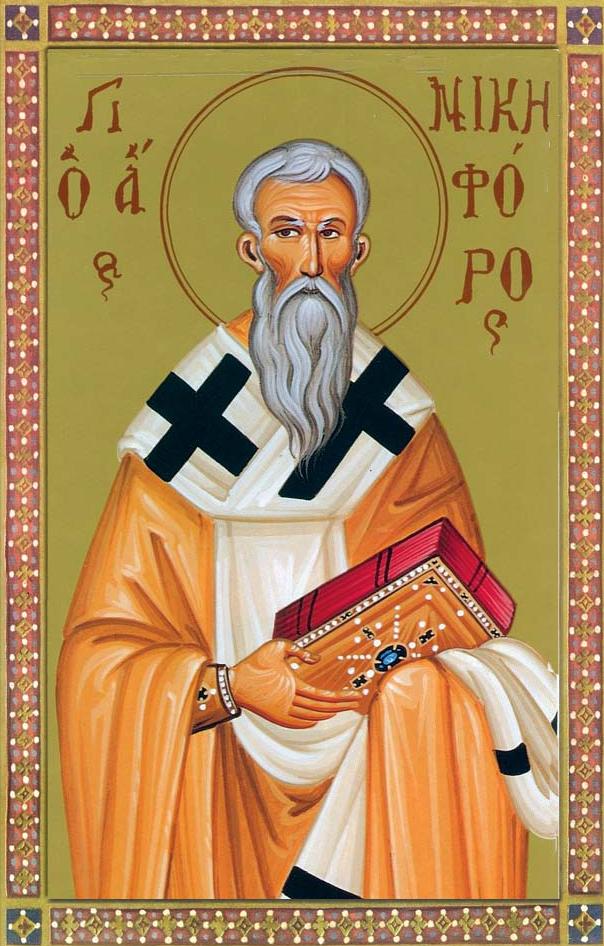
“What Rome is it, first called the seat of the apostles, that accords with you in rejecting the revered image of Christ? Rather, Rome joins us in laboring and rejoicing to honor that . What Alexandria is it, venerable precinct of the evangelist Mark, that ever joined in refusing to set up the bodily and material likeness of the Mother of God? Rather, Alexandria assists and agrees with us in this . What Antioch is it, far-famed seat of Peter, the chief , that concurs in insulting the representation of the saints? Rather, Antioch shares with us the long tradition of honoring these . What Jerusalem is it, renowned home of , the brother of the Lord, that conspires in destroying the traditions from the fathers?”
Nikephoros to the Emperor found in “The life of St. Nikephoros by the Deacon Ignatius” (written between 843 – 846) Elizabeth A. Fisher (translator), Alice-Mary Maffry Talbot (editor), Byzantine Defenders of Images: Eight Saints’ Lives in English Translation, B., Ch. V., pp. 81 – 82, Washington, DC: Dumbarton Oaks Research Library
and Collection, 1998.“It is the ancient law of the Church that whatever uncertainties or controversies arise in the Church of God, they are resolved and defined by the ecumenical synods, with the assent and approbation of the bishops who hold the apostolic sees.”
Patriarch St. Nicephorus. Trans. Dvornik, “Byzantium and the Roman Primacy” p. 102
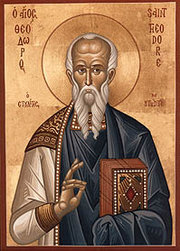
“We are not discussing wordly affairs. The right to judge them rests with the Emperor and the secular tribunal. But here it is a question of divine and heavenly decisions and those are reserved only to him to whom the Word of God has said: “Whatsoever you shall bind upon earth, will be bound in Heaven and whatsoever you shall loose on earth, shall be loosed in Heaven.” And who are the men to whom this order was given? -the Apostles and their successors. And who are their successors? –he who occupies the throne of Rome and is the first; the one who sits upon the throne of Constantinople and is the second; after them, those of Alexandria, Antioch, and Jerusalem. That is the Pentarchic authority in the Church. It is to them that all decision belongs in divine dogmas. The Emperor and he secular authority have the duty to aid them and to confirm what they have decided.”
St. Theodore the Studite. Dvornik, “Byzantium and the Roman Primacy” p. 101
Notice St. Theodore identifies all bishops as Peter. Here you can find a florilegium of other Church Fathers who identified all bishops, not just the bishop of Rome, as Peter.
“Just as Christ has placed in His body, that is to say, in His Church, a number of patriarchs equal to the number of the senses in the human body, the wellbeing of the Church will not suffer as long as these sees are of the same will, just as the body will function properly as long as the five senses remain intact and healthy. And because, among them, the See of Rome has precedence, it can well be compared to the sense of sight which is certainly the first of the senses of the body, since it is the most vigilant and since it remains more than any of the other sense, in communion with the whole body.”
Anastasius the Librarian (d. 878). Trans. Dvornik, “Byzantium and the Roman Primacy” p. 104
Great Number of Saints
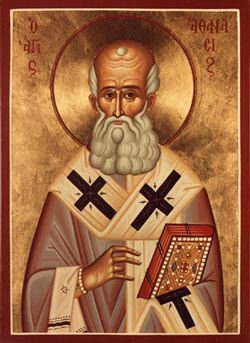
St. Athanasius of Alexandria
“For this was why an ecumenical synod has been held at Nicea, 318 bishops assembling to discuss the faith on account of the Arian heresy, namely, in order that local synods should no more be held on the subject of the Faith, but that, even if held, they should not hold good. For what does that Council lack, that any one should seek to innovate? It is full of piety, beloved; and has filled the whole world with it. Indians have acknowledged it and all Christians of other barbarous nations. Vain then is the labour of those who have often made attempts against it. […] For if one compare number with number, these who met at Nicea are more than those at local synods, inasmuch as the whole is greater than the part.”
St. Athanasius, Letter to the Bishops of African NPNF-2, Vol 4
The 318 at Nicea were believed to have been representative of the Church and so consisted of universal ratification.
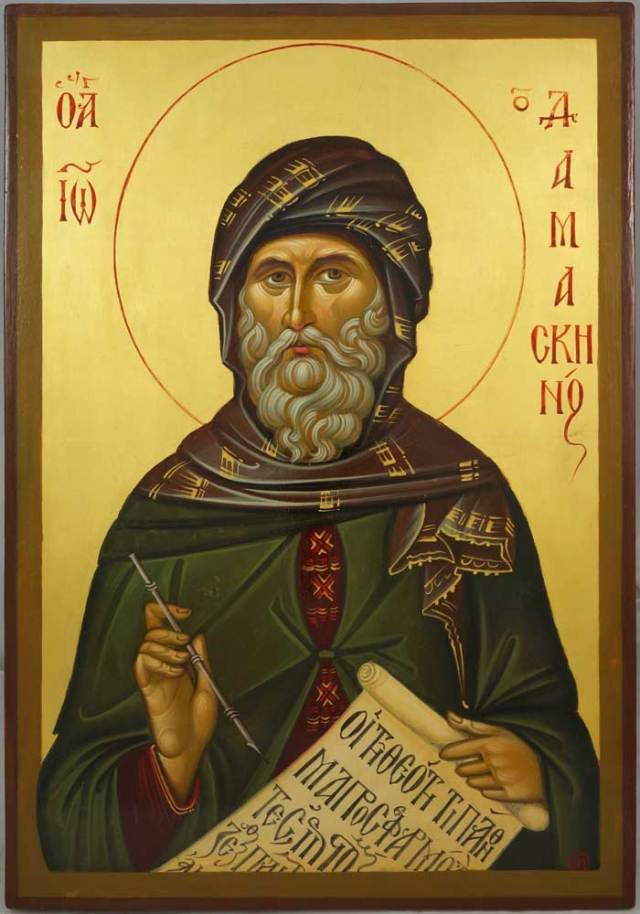
“And in the fourth holy and great Oecumenical Council, I mean the one at Chalcedon, we are told that it was in this form that the Hymn was sung; for the minutes of this holy assembly so record it. It is, therefore, a matter for laughter and ridicule that this ‘Thrice Holy’ Hymn, taught us by the angels, and confirmed by the averting of calamity, ratified and established by so great an assembly of the holy Fathers, and sung first by the Seraphim as a declaration of the three subsistences of the Godhead, should be mangled and forsooth emended to suit the view of the stupid Fuller as though he were higher than the Seraphim.”
John of Damascene, “Orthodox Faith,” NPNF-2, Vol 10, Book 9, Ch. 54
The idea being that saints could not be in discord with one another and so a small or a large amount in consensus would represent the Church so this ultimately goes back into universal consent.
Truth
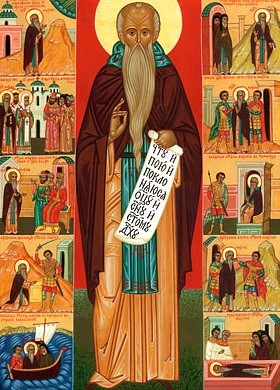
‘If it is the orders of emperors, but not orthodox faith that confirms synods which have been held, accept the synods which were held against the “homoousios,” because they were held at the order of emperors. I mean the first one in Tyre, the second in Antioch, the third in Seleucia, the fourth in Constantinople under the Arian Eudoxius; the fifth in Nicaea in Thrace; the sixth in Sirmium; and after these many years later, the seventh, the second one in Ephesus, at which Dioscorus presided. For the order of emperors convened all of these synods, and nevertheless all of them were condemned on account of the godlessness of the impious teachings that were confirmed by them. Why don’t you reject the one with deposed Paul of Samosata under the holy and blessed Dionysius, pope of Rome and Dionysius of Alexandria, and Gregory the Wonder-Worker, who presided over the same synod, because it was not held on the order of an emperor? What kind of canon declares that only those synods are approved which are convened on the order of emperors, or that generally speaking synods are convened at all on the order of an emperor? The devout canon of the church recognizes those synods as holy and approved which the correctness of their teaching approved.”
St. Maximus the Confessor “Maximus the Confessor and His Companions: Documents from Exile” Oxford University Press, 2003. Edited by Pauline Allen and Bronwen Neil, p. 91
Ratification by Rome Necessary
Now, the popes themselves and others regularly pointed out the role of the pope in ratifying councils via his auctoritas and this is a key point in the conciliar process per canon 34 of the Apostolic canons. The issue is Catholic apologists mistakenly assume that because the pope’s ratification is, in normal circumstances, necessary, that therefore the pope is exercising universal ordinary jurisdiction and can call the shots. They do not realize that the pope is ratifying as a member of the synod and anything he proposes is also subject to the council’s ratification – the quotations from Constantinople II above being a perfect example. For this reason, these quotations also support patriarchal ratification as the means to know whether or not a council is binding upon the faithful.
“There were present at this Synod ninety bishops from various cities. Maximus, however, bishop of Jerusalem; who had succeeded Macarius, did not attend, recollecting that he had been deceived and induced to subscribe the deposition of Athanasius. Neither was Julius, Bishop of the great Rome, there, nor had he sent a substitute, although, an ecclesiastical canon commands that the churches shall not make any ordinance against the opinion of the bishop of Rome.”
Socrates “Ecclesiastical History.” NFPF-2, Vol 2, Book II, Ch. VIII.
“…for he [Pope St. Julius] alleged that there is a sacerdotal canon which declares that whatever is enacted contrary to the judgement of the bishop of Rome is null.”
Sozomen, “Ecclesiastical History.” NPNF-2, Vol 2, Book III, Ch. 10.
Great number of bishops, ordered by Rome, convoked by the Emperor
Hincmar of Rheims
“It is obvious […] that synods are called universal and general when more bishops than in some of the above-mentioned synods meet, following the command of the Apostolic See and convocation by the emperor.”
Hincmar of Reims (d. 882), Opusculum 55 capitulorum PL 126, 361
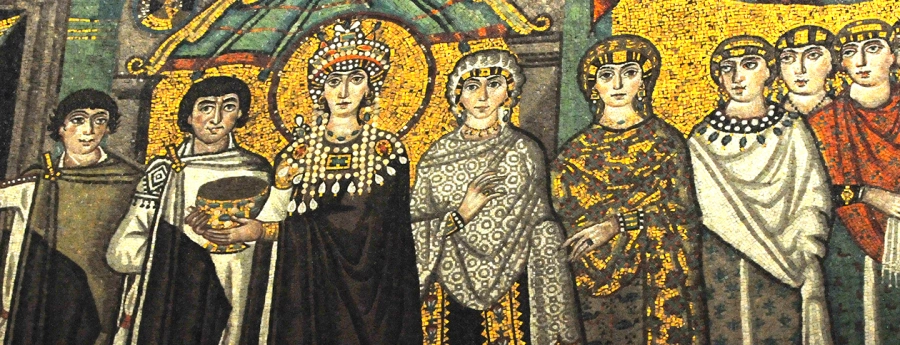
Pingback: The “New” Ecclesiology Isn’t New: A Critique of Fr. Peter Heers – Ancient Insights
Pingback: Conciliar Infallibility in the Orthodox Church – Ancient Insights
Perfect text, Ubi!
Just a corrigenda: St. Maximus’ quote about the truth of Council is at page 89, not at 91. Just for help.
Keep working,
Most Holy Theotokos, Pray for Us.
LikeLike
Pingback: What Makes a Council Ecumenical? Part II (A Florilegium) – Ubi Petrus Ibi Ecclesia
Pingback: An Orthodox Critique of Dr. Joel Anderson – Ancient Insights